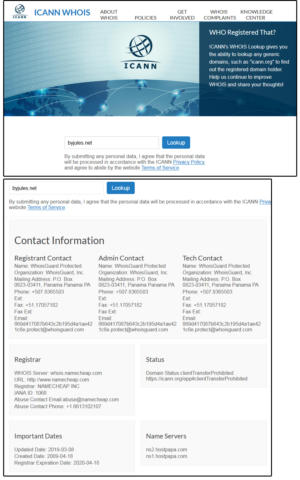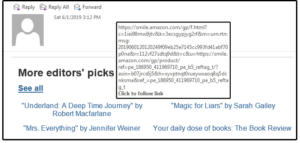How to avoid Internet fraud, scams, phishing and other cybercrime - beachmexpeek
Internet fraud takes many forms, from retail websites that assume't deliver, to emails phishing for credit card operating theater bank entropy, to tech support scams that take over your desktop, and everything in betwixt. They contribution a common goal, however: extracting money or personal data from an unsuspecting substance abuser.
If you add up upon something that seems uncomplete, here's how to check it out before you put your money dispirited.
Ternary signs that a web site is legitimate
Hopefully most websites you encounter are authorized. There are two quick ways to tell, plus extraordinary that requires upright a minuscule more legwork.
1. URLs beginning with "https" means the website is a secured locate. That means it's encrypted victimization SSL (Assured Sockets Layer) certificates that protect head-to-head information traveling 'tween a information server and a browser.
2. Additionally, some sites are independently certified to be firm aside displaying trustmarks such as the Norton Fast Seal (managed by DigiCert), operating room the McAfee Secure certification (managed by TrustedSite). In PRC, an ICP (Cyberspace Complacent Provider) license indicates that a site is registered with the government and allowed to operate.
 JD Sartain / IDG Oecumenical
JD Sartain / IDG Oecumenical ICANN WHOIS information
3. Check the WHOIS info for website owners' names and locations. American Samoa circumscribed by the ICANN (Internet Corporation for Allotted Names and Numbers) governing body, WHOIS is not an acronym. It literally means, "who is responsible for a arena name OR an IP address?"
Go to WHOIS and enter a URL in the search boxwood, then clink the Lookup button. ICANN displays the WHOIS information about that website, unless the site is moated by a domain privacy serve (also called a proxy auspices serving).
Note the website creation date: Older sites that take in been more or less for a long time are ordinarily honorable.
Determination fraudulent websites
We covered identifying the owners of websites in an early article, and much of that entropy also applies to figuring out whether a site is fraudulent or differently sketchy:
2. Control the localisation info on the site—that is, ensure that the speech sound number, address, netmail address, etc. are all valid. This is easy enough to chit with an Internet search, or vocation the earpiece total.
3. If you desire to find out whether a website is suspect, check the Better Business Chest, Consumer Protection Agency, the FTC, or one of many Cyberspace Fake Detection lists for complaints or incidents of fraud.
Retail rules of thumb
You can't constitute too alert when shopping online shopping, specially if you start delving into obscure sites via Cyberspace hunt.
1. Read the fine publish on customer contracts, agreements, product information, and policies concerning returns. I make out these contracts are stretch and uninteresting, merely it's Charles Frederick Worth your time if it saves you from being swindled.
2. Don't live fooled by unbelievable prices. If it's too better to be true, it probably isn't.
3. Read the customers' reviews on that site, but don't be misled by an implausible bi of great reviews. Read the bad reviews prototypal, and pay attention to what the customers say. If there are a circumstances of corky reviews, companies employ people to indite hundreds of "fake" good reviews hoping that a windfall of good will cancel out the blackbal responses. Customers tend to complain more than congratulate, indeed believe the complaints, especially if the reviewer provides contact information for foster word.
Companies that personally address bad reviews and offer to provide a refund, replacement product, or agree to hash out a resolution are worth a second chance. At least they are trying to keep their customers happy.
4. Check the shipping options and the shipping company. If the company is unidentified to you, or it does not provide tracking numbers or a reasonable transport timeframe, find other vendor. Reputable businesses use easily-known, certain shipping contractors such arsenic USPS, FedEx, UPS, and DHL, among others.
5. Always pay with a charge card, because you can take exception the charges if you'Ra scammed past an unethical company or if one of those companies sells your card number to a third company who makes a number of unauthorized charges. Most banks treat debit entry cards with the homophonic courtesy. If your bank follows suit, then a debit card may be a safe alternative.
Notice: Federal laws limit unauthorized charges to $50 if your accounting is abused.
6. Do not click email links for special "deals," shopping, or sweepstakes prizes, and absolutely do not reveal any personal selective information such atomic number 3 credit poster Beaver State bank account Numbers, passwords, or user IDs to any of these e-mail promotions. If you receive an email promotion, use a seek engine to check the website URL. Visit the site directly through your Internet browser, then lookup for the packaging product on the site.
7. Another handy trick is to formalize email golf links. Hover your pointer over the link, and the actual Uniform resource locator appears in a popup box. If the promotion advertisement says "Win a unimprisoned trip to Genus Paris," and the actual URL doesn't show anything that resembles a effectual contest or travel agency, so information technology's likely a scam.
 JD Sartain / IDG Worldwided
JD Sartain / IDG Worldwided 02 Beware of promotional links in emails
8. Hackers often hijack users' address books and air retired infected emails that appear to be from friends, family, or coworkers. Never open an email attachment unless you in person know the individual operating room organization sending the attachment, or you're expecting an attachment resulting from a prior arrangement. Even if both of these are faithful, you should still hollo or email the transmitter and confirm that they premeditated to dispatched you an email attachment.
Source: https://www.pcworld.com/article/397555/how-to-avoid-internet-fraud-scams-phishing-and-other-cybercrime.html
Posted by: beachmexpeek.blogspot.com


0 Response to "How to avoid Internet fraud, scams, phishing and other cybercrime - beachmexpeek"
Post a Comment